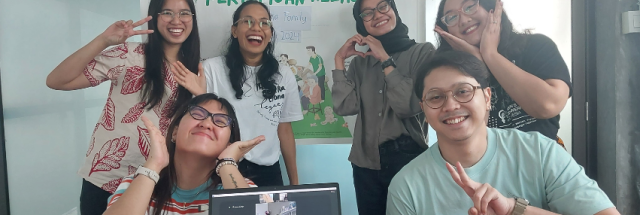"...when working on this, I realized I was obstructing myself, still not accepting, and even feeling guilty to admit that my parents had neglected me. I felt like I was still denying it. After a while, I reminded myself that this process was not to blame or to justify them, but to accept that they were imperfect and had shortcomings.
Every reconciliation process in the School of Reconciliation begins with awareness of the part of oneself that needs to be addressed. As conveyed by one participant, the readings at each meeting encourage them to reflect and inspire them to take steps. This is certainly not easy. Some were hesitant to continue the class, realizing the challenging tasks they had for themselves after the various discoveries from the readings and discussion.
Through assistance in class and one-on-one sessions with the facilitator, participants understood that self-improvement is not an instantaneous process. Self-improvement requires consistent effort. Only then do the knots of doubt and fear unravel one by one. However, this can only happen if the facilitator can listen wholeheartedly and the participants are willing to open themselves and learn.
Self-improvement does not only happen in the classroom but in the Reconciliation School system itself. We started team-building sessions in January 2024 and improved the curriculum and technicalities.
In the team-building session, each member examines their role in the team. Everyone sees if there are any identities from the family that carry over to their relationships within the team. This helps each of us realize the nature of our relationships and conflicts so that everyone can position themselves appropriately and accept the right amount of responsibility.
Revamping the curriculum and system was also done for a better classroom environment. Some roles were trimmed, divided, and added to be more efficient. In this semester, the role of deputy facilitator was eliminated. Administration is centered on an administrator and assisted by positions filled by participants such as attendance and concise findings at the end of each meeting. Facilitators also receive a comprehensive class guide so they can design classes according to their characteristics without deviating from the curriculum.
The changes in the class system had an impact on the schedule and rhythm of the class. The impression was that the class rhythm was slower than in previous years. However, this has helped participants to have more time to digest the material and work on the exercises.

This semester, every participant is required to attend offline classes. Some offline classes will be held in Yogyakarta, Jakarta, Manado, Bandung, and Banyuwangi. Offline classes are designed not only for formal class sessions but can also be adjusted to class agreements such as outings, camping, etc. 68 students are studying in various class levels such as On The Family, Homecoming, Inner Bonding, Learning to Love Yourself, and Road less Travelled. Sekolah Rekonsiliasi is accompanied by 2 facilitators, Nenden Prawira and Rinni Meir.
Rinni Meir Rakmeni
Principal of School of Reconciliation
Editor: Ari Budi
Proofread: Peter Heyes

